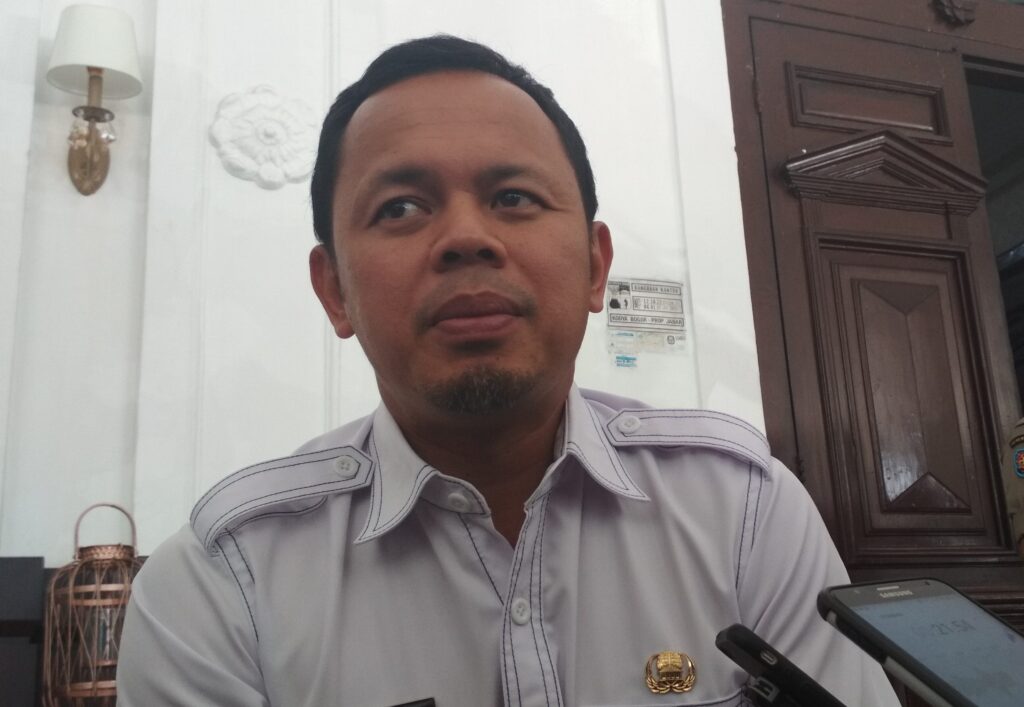When hospitalized for 22 days in Bogor General Hospital, Bima Arya Sugiarto, the mayor of Bogor, only consumed fruits, vitamins and high-fiber foods, as well as antivirus drugs. The novel coronavirus (SARS-CoV2) that attached to his airway made him difficult to breath. He had to bear with the disturbing cough, combined with a cold, since the first day he underwent medical treatment in the isolation room on March 19. The result of radiography showing white spots on his lungs marked that the mayor, who is now on his second term, suffered from bronchopneumonia or lung inflammation.
“The pulmonologist who treated me said that I was fortunate because I did not smoke,” Bima told Jaring.id during a phone interview on Friday, May 29.
The World Health Organization (WHO) warns that smoking is one of the factors that increase the risk of respiratory tract infection. In the time of pandemic, the intake of fruits, vitamins and high-fiber food, would not be effective enough if the person does not live a healthy lifestyle, said Bima, reiterating the doctor’s statement.
“A person with comorbidity, especially lung diseases, will have higher risk (of being infected with coronavirus),” he said.

Based on the data in the official website of covid19.go.id, hypertension is the number one comorbidity. At least 320 patients, who have been tested positive of Covid-19, also have elevated blood pressure.
Besides hypertension, other comorbidities with high prevalence is diabetes–with more than 200 Covid-19 patients known to have this disorder, followed by heart disease that happened to 125 patients of Covid-19, and chronic obstructive pulmonary occurring in 96 patients.
Among the causes of the aforementioned comorbidities is the exposure to cigarette smoke.
WHO mentioned that cigarettes have killed more than 8 million people worldwide every year, with around 7 million of them were active smokers and 1.2 million others died as passive smokers.
Using the WHO data as a reference, Bima has determined to enforce the Bylaw Number 10 Year 2018 on Non-Smoking Areas in Bogor during this pandemic. In addition to discipline the movement of citizens, the authority should be more active in limiting the space for smokers.
“Precisely, I think this pandemic is the perfect moment to promote the campaign of healthy lifestyle, including to stop smoking. The lungs that are full of nicotine will become an ideal place for coronavirus,” he said.
Bima Arya is one of the 7,015 patients who have recovered from Covid-19 in Indonesia. Since the first case of coronavirus disease was announced by President Joko Widodo at the end of February, the number of patients who have been confirmed positive as of Saturday, May 30, has reached 25,773, or equal to 0.41 percent from the total number of worldwide cases of 5,796,257.
In Indonesia, out of the total number of cases, 1,573 patients died and 17,185 are hospitalized.
***
Considering the high number of Covid-19 that kept rising, WHO on April 29 gave a statement about the danger of smoking. On its website, it explained that the harmful ingredients in cigarettes damaged the function of lungs. In fact, during a pandemic, acute infectious respiratory diseases need to be prevented with a prime immune system. In addition, WHO stated that smoking activity had the potential to become a transmission medium for the virus to infiltrate into the respiratory tract.
Agus Dwi Susanto, Chairman of the Indonesian Pulmonologists Association, shared a similar view with the WHO statement. He explained his opinions during an online discussion themed “Ramai-ramai Surati Presiden: Perkuat Penanganan Covid-19 melalui Rumah Tanpa Rokok” (Sending a Letter to the President Together : Strengthening the Efforts against Covid-19 through Smoking-Free Home”) hosted by the Alliance of Independent Journalists (AJI) in Jakarta.
According to Agus, there were at least three factors that increased the risks of contracting Covid-19 for smokers, both conventional and electric. The first one is the substances contained in cigarettes that were resulted from smoking activity, including nicotine, carbon monoxide, free radicals and carcinogenic substances such as TAR. These hazardous chemicals can weaken the immunity system, especially the respiratory organs. Nicotine disturbs the functions of blood vessels, and the carcinogenic TAR causes cancer. Carbon monoxide makes the haemoglobin in the blood bind the oxygen 300 times stronger, thus hampering the red blood cells to transport oxygen throughout the body. This condition can spark various diseases.
“This clearly affects our health,” the doctor said, referring to the health journal New England Journal of Medicine (NEJM) published on January 31.
He highlighted that out of 1,000 patients of Covid-19 who were involved in the research, 12.3 percent of them were smokers.
Another research titled Smoking Associated with Covid-19 Progression by Roengrudee Patanavanich, a researcher from the Center for Tobacco Control Research and Education at the Medical Faculty of University of California, San Francisco, discovered a connection between smoking habit and the worsening condition of Covid-19 patients.
In Indonesia, according to Agus, there were 111 out of 199 patients in Persahabatan Hospital, who experienced a worsening condition due to comorbidity, with the following percentage of cases : hypertension 30.4%, diabetes 21.7%, renal failure 8.7%, heart failure 4.3% and asthma 2.2%.
“Preliminary data in one of the referral hospitals in Jakarta shows that Covid-19 patients are mostly men. Around 58.3% of them are smokers, and 41.7% are not,” Agus explained.
Another factor is related to the genome of the novel coronavirus. According to Agus, the virus has a spike protein that has a nail-like shape, enabling it to attach to the ACE-2 (angiotensin converting enzyme 2)—an enzyme found in the lung cell membrane.
“The lungs of a smoker contain ACE receptors 40 to 50% higher than that of a non-smoker,” Agus explained.
***
Chairman of the National Commission of Tobacco Control, Hasbullah Thabrany, evaluated that smoking habit is counterproductive with the effort to minimize the number of people contracting Covid-19 in Indonesia. Therefore, the commission sent a letter to the President on Monday, April 27.
Besides declaring its support to the government, the commission, in its letter number 033/KOMNASPT/SK/IV/2020, also explained a scientific research about smoking habits that will enhance the risk of Covid-19 infection. Hasbullah also reminded President Jokowi to take actions to reduce the possibilities of misusing social assistance. According to the commission, the beneficiaries often use the aid to buy cigarettes.
“We, representing 22 organizations, are very concerned about this, and urge the government to be more strict in banning cigarette advertisements and sales,” the professor said.
The prohibition of cigarette ads throughout all electronic, digital and printed media during this pandemic is considered crucial because at the moment, all family activities, including studying and worshipping is conducted at home. Therefore, Hasbullah said, the central and regional government should enforce the policy of Non Smoking Area, including at home.
“We urge the government not to be careless, because the factor that worsens (the patients’ condition) is related to cigarette consumption,” Professor Hasbullah stressed.
However, a month after the letter was sent, the President remained unmoved. There was no policy to urge the public to reduce cigarette consumption in the time of the novel coronavirus pandemic.
According to Feni Fitriani Taufik, a pulmonologist in Persahabatan Hospital, Jakarta, information about the bad effects of smoking on Covid-19 patients should be disseminated to the public. Moreover, nobody knows for sure when this pandemic will end.
“The government should not only campaign about social distancing. When a lot of people still smoke, they can be an easy target of the virus. The most important thing is to maintain long term health,” Feni said.
Cut Putrie Arianie, the director of prevention and control of non-communicable disease at the Health Ministry, emphasized that the ministry had often warned the public about the danger of smoking.
“Until now, we consistently remind the sane society to avoid smoking,” said Cut Putrie in a phone interview on Wednesday, May 6.
Unfortunately, the policy of Large Scale Social Distancing in several regions made it difficult for the ministry to conduct direct campaigns to the public. She claimed that the ministry had used social media to disseminate information about the danger of smoking.
Based on the observation of Jaring.id, the last time that the ministry used its account in Instagram to campaign about the danger of electric cigarettes was on January 16.
Since then, the account has been dominated by contents related to hygiene and sanitation, including washing hands, wearing masks and keeping distance. Meanwhile, its Twitter account and its website www.kemenkes.go.id that is accessible to the public is not used as a means of campaigning on the bad effects of smoking during the pandemic.
“Smoking is dangerous for health. Both in the time of pandemic or not, it remains dangerous. Even when we campaigned it during the normal situation, there were people who did not obey it,” Cut Putrie argued.
In the ministry’s 2018 basic health research, the prevalence of tobacco consumption, both smoked or chewed, increased by 33.8% compared to the 2016 figure.
Regardless of the warning by the government, Sahrul Haetamy, a smoker, had begun to change his smoking habit on his own will. Previously, he could consume two packs of cigarettes per day. Now, however, he could not even finish five sticks.
“I am anxious and scared. Covid-19 becomes sort of shock therapy for me,” said Sahrul during a phone interview on Wednesday, May 6.
Sahrul started to change his pattern of cigarette consumption since he was included in the list of ‘Person under Observation’. The inclusion was because he had contact with a Covid-19 patient in April.
“I started to read journals and news. I found out that smokers had a greater chance of contracting the (Covid-19) disease, because the condition of their lungs were unwell and worse than those who do not smoke. Since then, I changed (my smoking habit),” he told Jaring.id.
Although it was uneasy for him to reduce smoking, he added, the policy of Large Scale Social Distancing in the capital helped him to refrain from smoking.
“I smoke a lot when I hang out and discuss work stuff,” he added.
Unlike Sahrul, Maulana Septiadi opted to not follow WHO advice, claiming that smoking helped him to feel more relaxed while working from home. “I keep smoking to relieve my boredom,” said Maulana when interviewed on Saturday, May 9.







